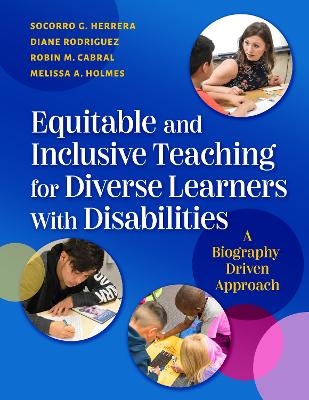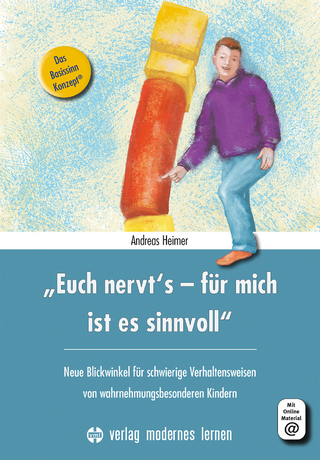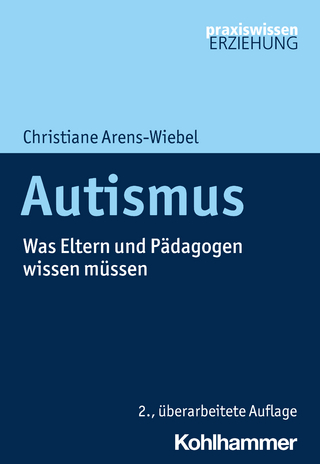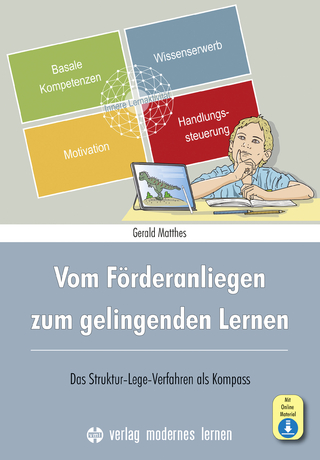
Equitable and Inclusive Teaching for Diverse Learners With Disabilities
Teachers' College Press (Verlag)
978-0-8077-6800-6 (ISBN)
The need for teachers who have both the knowledge and skills to teach students in special education, especially students who are emergent bilinguals, is more critical today than ever before. Assumptions about the assurances outlined in the Individuals with Disabilities Education Act (IDEA) have led to practices that have limited the scope of opportunities for culturally and linguistically diverse (CLD) students with disabilities. This book examines the intent of special education policy, challenges existing systems, and explores the promise of using biography-driven instruction to transform students’ learning and enhance their personal growth and community life. With a focus on inclusive practices for working with CLD students with disabilities and their families, the book examines decision-making processes for placement, access, instruction, assessment, and evaluation. The authors show how inclusionary practices create contexts and conditions for teachers to foster their students’ academic abilities through authentic cariño and an ecology of care.
Book Features:
Elucidates the challenges faced by educators and support personnel as they navigate and prioritize the needs of CLD students with disabilities in inclusive classrooms.
Reveals the outdated, politically driven, inequitable, and inconsequential educational opportunities often afforded to CLD students receiving special services.
Provides a framework for creating learning opportunities grounded in the six principles of IDEA and the personal and academic biographies of learners and their families.
Supports teachers and other staff to maximize four interrelated facets of the CLD student biography: sociocultural, linguistic, cognitive, and academic.
Explores the multiple meanings of inclusion and academic engagement at the intersection of IDEA and biography-driven instruction.
Socorro G. Herrera is a professor of curriculum and instruction and executive director of the Center for Intercultural and Multilingual Advocacy (CIMA) at Kansas State University. Diane Rodriguez is a professor and associate dean in the Graduate School of Education at Fordham University. Robin M. Cabral is an educational consultant with a background in district-level administration, bilingual speech language pathology, special education, literacy, assessment, and intervention development. Melissa A. Holmes is associate director of CIMA.
Contents
Foreword ix
Acknowledgments xiii
Introduction 1
Part I. Historically Centering the Student Through IDEA
1. Searching for Coal in a Gold Mine: Overlooking the Multifaceted Assets of the Learner 7
In Search of Answers 7
Beyond a Deficit Perspective: Exploring Gaps in Systems 9
The Foundation of an Asset-Driven Agenda 10
Conclusion 12
2. Setting the Stage for Cognitive and Socioemotional Resilience: Reflecting on the Intersection of Policy and Systems 14
IDEA: With the Best of Intentions . . . Have We Arrived? 14
Response to Intervention: Moving Beyond Reductionistic Exercises 19
Biography: Noticing and Documenting Learner Potential 22
Conclusion 23
Part II. Applying Biography-Driven Practices in Inclusive Classrooms
3. A Biography-Driven Individualized Educational Plan 27
Moving Beyond Good Intentions Toward Documentable Impact 28
Redefining Possibilities Through Equitable Instructional Delivery 33
Creating Conditions and Situations for CLD Learners to Thrive 34
“My Teacher Made Me Smart” 40
Teachers Who See, Teachers Who Know: Observation, Facilitation, and Affirmation 41
Building Blocks: Equity and Authentic Cariño 42
Conclusion 43
4. Enriching Opportunities to Learn Through Collaborative Interaction 44
From “Me” to “We”: Community Processes and Shared Products 45
Maximizing Joint Productive Activity to Respond to the Whole Child 46
Fostering Joint Productive Activity Through i+TpsI 52
Using BDI Strategies to Guide Interactional Processes 53
Conclusion 57
5. Creating Contexts and Conditions for an Inclusive Community Through Classroom Talk 58
Catalyzing Learning Through Community: Caring and Learning in Action 59
Beginning With Biographies: Equity Begins With “i” 60
Situationally Speaking: The Ebb and Flow of Reciprocal Talk 63
Collaboration: Affirmation as Equity 66
Agency “I”: Context, Conditions, and Situations 67
Conclusion 68
Part III. Reimagining Equity for All Learners
6. Real-Life Language Development: A Bridge for Inclusive Classrooms 71
BDI as Treatment Context 72
Conclusion 83
7. The Power of BDI for Students With Low-Incidence Disabilities 85
What’s in the Label: Categorizing the Contradictions 85
Social Model of Disability, UDL, and BDI 89
Conclusion 90
8. Reframing Our Thoughts and Actions Through an Exceptional BDI Foundation: A Call to Action 93
With Dr. Natasha Reyes and Dr. Leonard Steen
Exploring Perspectives of Referring Teachers 95
Examining Practices and Perspectives of Child Study Teams 96
The Elephant in the Process 98
Conclusion 105
Glossary 109
Appendix A: Overview of Select BDI Strategies 114
Appendix B: Template for Biography-Driven Goal Development Tool 116
References 117
Index 124
About the Authors 129
| Erscheinungsdatum | 11.07.2023 |
|---|---|
| Vorwort | Alfredo J. Artiles |
| Verlagsort | New York |
| Sprache | englisch |
| Maße | 216 x 279 mm |
| Gewicht | 204 g |
| Themenwelt | Sozialwissenschaften ► Pädagogik ► Sonder-, Heil- und Förderpädagogik |
| ISBN-10 | 0-8077-6800-6 / 0807768006 |
| ISBN-13 | 978-0-8077-6800-6 / 9780807768006 |
| Zustand | Neuware |
| Haben Sie eine Frage zum Produkt? |
aus dem Bereich


